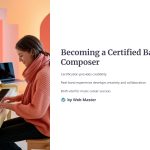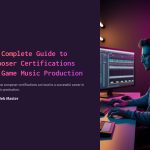 In the music industry, having a composer certification can open many doors, providing credibility and professional recognition. However, real-world composition experience—especially in a band setting—is equally, if not more, valuable. This article explores the path to obtaining a composer certification, the challenges of composing for a band, and how both can enhance your career as a musician.
In the music industry, having a composer certification can open many doors, providing credibility and professional recognition. However, real-world composition experience—especially in a band setting—is equally, if not more, valuable. This article explores the path to obtaining a composer certification, the challenges of composing for a band, and how both can enhance your career as a musician.

Understanding Composer Certifications
Composer certifications vary by country, with some offering official licenses or degrees while others rely on portfolio-based assessments. Many institutions provide courses covering music theory, orchestration, and digital composition, often requiring students to pass both written exams and practical demonstrations.
Popular certifications include:
- Berklee College of Music Online Certifications (Composition & Orchestration)
- ABRSM Composition Exams
- RIA (Recording Industry Association) Certifications
- National Guild of Composers’ Certificates
While these certifications validate your knowledge, they do not guarantee success. Real-world application through projects, collaborations, and networking is crucial.

The Reality of Band Composition
Composing for a band is vastly different from writing solo pieces or orchestrating film scores. Unlike classical composition, band music requires strong collaboration, adaptability, and an understanding of individual instrument dynamics.
Key Challenges:
- Balancing Creativity & Commercial Appeal – While experimenting is important, mainstream success often requires catchy melodies and structured songwriting.
- Instrument Arrangement – Understanding the role of each instrument ensures the composition is balanced and impactful.
- Managing Band Dynamics – Dealing with differing opinions and ensuring everyone’s voice is heard can be challenging.
- Live Performance Feasibility – Some compositions sound great in the studio but are impractical for live settings.

Essential Skills for Band Composers
To thrive as a band composer, technical and interpersonal skills are equally important. Some key skills include:
- Music Theory & Arrangement – Knowing how chords, scales, and harmonies work together.
- DAW Proficiency – Digital tools like Ableton, Logic Pro, and FL Studio are crucial for modern composition.
- Lyric Writing – Even if you’re not the vocalist, understanding lyrics’ impact on melody is essential.
- Adaptability – Being able to modify compositions based on feedback.
- Communication & Leadership – Directing a band effectively requires both artistic vision and people management.
Learn More About Music Composition Courses

How to Get Your First Composition Gig
Breaking into the industry requires exposure, networking, and persistence. Some ways to land your first composition gig include:
- Uploading Your Work – Platforms like SoundCloud, YouTube, and Bandcamp help showcase your skills.
- Networking – Attending music events, joining online composer communities, and collaborating with local artists.
- Freelancing – Websites like Upwork and Fiverr allow new composers to gain professional experience.
- Joining a Band – Many successful composers started as band members before transitioning into full-time composition.

Transitioning from Band Composer to Professional Composer
While band composition is rewarding, many musicians eventually explore film scoring, game music, or full-time music production. To make this transition:
- Expand Your Portfolio – Demonstrate versatility by composing for different genres.
- Study Sound Design & Scoring – Learn how to create music for various media.
- Connect with Producers & Directors – Building relationships in the entertainment industry helps in securing projects.
Find Freelance Music Composition Jobs

Final Thoughts
Becoming a certified composer while gaining band experience is an excellent strategy for any aspiring musician. Certification provides credibility, while band experience enhances creativity, collaboration, and real-world adaptability. Balancing both aspects can help you develop a sustainable and successful music career.
If you are passionate about composing, consider pursuing formal education while actively engaging in band projects. Whether you’re composing for a small indie band or a major film, your ability to create impactful music will determine your success in the industry.
*Capturing unauthorized images is prohibited*





